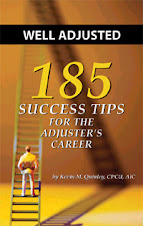Do attorneys make good adjusters?
Here are some thoughts on the pro’s and con’s of having attorneys transition into a claims role:
Pro’s
· Solid grounding in legal principles, especially tort, liability and contract principles
· Ability to analyze what liability and coverage defenses may fly and which ones are losers
· ork well with outside counsel since they “speak the same language” and have common frames of reference
· Effective review of outside counsel billings, knowing where the “fudge factors” might lie and having some sense of how long legal tasks really should take if done efficiently
Cons
· Paralysis by analysis. Constipated decision-making by never quite having enough information or facts. Decision-making is no longer done by the client, but by the claim-handler.
· Difficulty in adjusting to higher caseloads of claim staff, perhaps multiples of what counsel handled while in private practice.
· “Circle the wagons” affinity with outside counsel in relating to them so much that objectivity is lost.
· May over-compensate as a former attorney by bearing down too hard on outside legal bills, becoming outside counsel’s worst nightmare.
So what do you think? In your view, do attorneys make good adjusters and claim-handlers?





